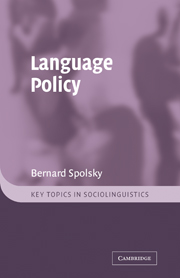Book contents
- Frontmatter
- Contents
- List of tables
- Preface
- 1 Language practices, ideology and beliefs, and management and planning
- 2 Driving out the bad
- 3 Pursuing the good and dealing with the new
- 4 The nature of language policy and its domains
- 5 Two monolingual polities – Iceland and France
- 6 How English spread
- 7 Does the US have a language policy or just civil rights?
- 8 Language rights
- 9 Monolingual polities under pressure
- 10 Monolingual polities with recognized linguistic minorities
- 11 Partitioning language space – two, three, many
- 12 Resisting language shift
- 13 Conclusions
- References
- Index
6 - How English spread
Published online by Cambridge University Press: 22 December 2009
- Frontmatter
- Contents
- List of tables
- Preface
- 1 Language practices, ideology and beliefs, and management and planning
- 2 Driving out the bad
- 3 Pursuing the good and dealing with the new
- 4 The nature of language policy and its domains
- 5 Two monolingual polities – Iceland and France
- 6 How English spread
- 7 Does the US have a language policy or just civil rights?
- 8 Language rights
- 9 Monolingual polities under pressure
- 10 Monolingual polities with recognized linguistic minorities
- 11 Partitioning language space – two, three, many
- 12 Resisting language shift
- 13 Conclusions
- References
- Index
Summary
THE SPREAD OF ENGLISH
French language policy was driven by a desire to assert national unity, homogeneity and identity in the multilingual regions under developing political control. To start, the principal threats to the language were internal – the regional varieties that encouraged diversity and detracted from central power. After the Second World War, with the formation of the European Community, a new enemy began to emerge – English. While at first it might be seen as simply another European language, like German and Spanish, that needed to be kept in its place in the new supra-national organization, its invasion of French language space through borrowing and its growing global use as language of science, technology, sport, computers, popular music, trade and commerce, drove the French to major language management, including a constitutional amendment, a series of laws and regulations and a host of bureaucratic agencies. Thus, it is not unreasonable to suggest that in the latter part of the twentieth century, the threat of English became the main driving force for French language policy. The issue to be considered in this chapter follows from this. Was the threat itself the result of language policy? Did English become a threat not just to French but to many other national languages, as a result of successful language management by its supporters?
English, it is generally agreed, is today in a stronger position in the world not just than any contemporary language but also than any other historical language.
- Type
- Chapter
- Information
- Language Policy , pp. 76 - 91Publisher: Cambridge University PressPrint publication year: 2003

